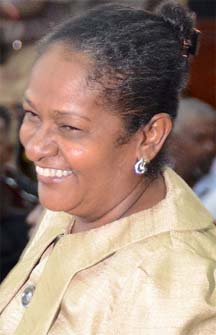The combined opposition further asserted itself in Parliament last evening, as it forced the deferral of financial papers for extra-budgetary sums, citing a lack of transparency.
In a sitting, which became fiery at times, and was presided over by Deputy Speaker Deborah Backer, the APNU and AFC voted against four items during the examination of Financial Paper 7/2011 and caused Financial Paper 8/2011 to be withdrawn for return to the House on March 15.
Speaker Raphael Trotman is currently overseas.

The government and the opposition traded barbs over the propriety of several items on Financial Paper 7/2011. The first casualty was an additional $25.5 million sought to meet expenditure associated with the conferment of National Awards and other events hosted by the state; in this case the swearing in of President Donald Ramotar and the new Cabinet members late last year.
Next, the opposition voted down a sought provision of $6.5 million for the provision of payment of an honorarium for staff of the General Register Office working during the second Claims and Objections period in the run up to national and regional elections last year.
The opposition also voted against a sum of $18.5 million for the provision of security equipment for the Guyana Police Force and against a sum of $29.1 million for the provision of mobilization payments on infrastructural works for the specialty hospital, for which the sum of $150 million had been allocated in the budget of 2011.
During the deliberations of the Committee of Supply, Minister of Finance Dr. Ashni Singh said that the $150 million that had been originally voted had not been spent. He explained that at the time of the preparation of the 2011 budget it was not clear how much funding the Government of Guyana would have been getting from the Government of India to finance the project.
“At the time that the budget came to Parliament the project was at an early stage. So we could not know what it would cost.
We were assured that the approval would be forthcoming by the end of the year [2011],” he said. “What we did not have were the details…the design had not been concluded,” Singh said. He made it clear that while the Indian government was providing the finances for the project, this did not include site preparation.
Shadow Finance Minister Carl Greenidge of APNU asked whether it was not normal for a project design to be considered before allocating monies for it in the budget. “The issue is why we are asking for additional expenditure that was not a part of the project?” he asked.
The Parliament concluded its deliberation on Financial Paper 7/2011 and it was passed following meetings among the parties to consider the heads that were not voted and how those amendments would have changed the amount of money being approved in that paper. In the end, the House approved $2.151 billion out of $2.240 billion originally sought.
Following this, the Committee of Supply turned its attention to Financial Paper 8/2011. Greenidge stood up to propose a motion deferring the consideration of that financial paper so that there could be the opportunity to amend certain parts – the legend for the items in particular – so that they could be more transparent, according to the opposition. He said that the paper as presented breached provisions of the Fiscal Management and Accountability Act. He said that his party would have no issue with supporting the financial paper provided that the changes were made.
The AFC’s Khemraj Ramjattan supported this proposal for the motion to defer the consideration of the financial paper, stating that it was not in keeping with the FMAA and that it was an insult to taxpayers.
This financial paper has a total of $3.471 billion in monies sought for foreign funded projects – the electrification programme, the East Bank Highway Improvement, the acquisition of ferries, and the Education for All Fast Track Initiative education project.
Singh said the purpose of the financial paper was to bring to account where a donor has disbursed in excess of what is anticipated. “Financial Paper has nothing to do with the Contingencies Fund but with donor funding disbursed in excess of what has been anticipated,” the minister said, countering arguments by the opposition that the funding came out of the Contingencies Fund.
The minister explained that in foreign funded projects, the donor will not necessarily hand over cash to the government to put into the Consolidated Fund.
He cited an example of the Chinese government which donated the ferries. He said that the Chinese government paid a company in China to build the ferries and then paid all of the associated costs to bring the ferries to Guyana.
Singh explained that all of this constituted the quantum of the donation of the ferries and it must be reflected in the books, where a sum is received and where expenditure made from it for the provision of the ferries.
“There is no basis for the [request for] resubmission. We are available to answer any questions from the opposition,” said Singh, while addressing the Committee of Supply. The Prime Minister then announced that the matter will return to the House on March 15, 2012.




